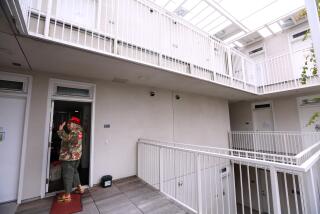Editorial: Eric Garcetti ducks another tough choice — this time on affordable housing
Los Angeles Mayor Eric Garcetti has been on the campaign trail almost every day lately, encouraging people to vote for Measure M, the countywide sales tax increase for transportation, and Measure HHH, the city’s bond to build housing for the homeless. He backs Measure RRR to change Department of Water and Power oversight, and he’s publicly thrown his support behind Measure CC, the Los Angeles Community College District bond measure to modernize its campuses. He’s even opined in favor of upholding the state’s plastic-bag ban, and he’s endorsed candidates in various local races.
Yet Garcetti has refused to take a position publicly on one particular ballot measure that would affect the city directly — and could interfere with his promise to build 100,000 units of housing by 2021. That’s Measure JJJ, a labor-sponsored initiative that would impose some of the nation’s most demanding affordable-housing and wage mandates on privately funded development.
If JJJ is passed, most developers of housing projects that require waivers from city planning and zoning rules would have to guarantee that as much as 25% (apartments) or 40% (condominiums and homes) of the units are affordable to low- and moderate-income tenants; that workers are paid close to union-level wages; that 30% of those hired are L.A. residents; and that 10% of the project’s crew members live within 5 miles of the site and are so-called transitional workers, which includes the homeless, single parents, veterans and those lacking a high school diploma.
Garcetti has remained conspicuously silent on Measure JJJ. Why?
Supporters argue that the mandates would benefit the community by providing more units of affordable housing and good-paying jobs for local residents. Opponents, including The Times’ editorial board, worry that they could do the opposite, increasing the cost of new construction so much that fewer construction workers would be employed and fewer homes for low- and middle-income Angelenos would end up getting built, worsening the city’s housing crisis.
Also, if Measure JJJ passes, there would be considerably less support for Garcetti’s own affordable-housing solution. Last year, he proposed a fee on new residential and commercial development that could generate up to $130 million a year to create subsidized housing for low-income families. That proposal has its first public hearing on Tuesday. But there are only so many new fees and mandates that the city can impose before developers decide to take their business elsewhere.
Nevertheless, Garcetti has remained conspicuously silent on Measure JJJ. Why? His spokeswoman said that although the mayor supports the intent of the measure — ostensibly to create more affordable housing and higher-wage jobs — he worries that deciding such policies at the ballot box can “result in unintended consequences that can be counterproductive to our end goal.” OK. If he’s worried about unintended and counterproductive consequences, why not call on voters to reject JJJ? If he prefers handling such policies through legislation, then he should advocate for that publicly and demonstrate to voters that he and his colleagues at City Hall are on the job, coming up with real solutions.
But no, Garcetti is ducking the tough choice here, as he did last year when he refused to take a position on ballot measures to move city elections from odd- to even-numbered years — a significant change that will affect local politics — and he wouldn’t give a straight answer on the Trans-Pacific Partnership trade deal, despite the fact that it could have a major impact on the Port of Los Angeles. And sadly, he’s not alone. Other profiles in civic courage include City Council President Herb Wesson, Councilman Gil Cedillo, who heads the housing committee, and Councilman Jose Huizar, who heads the planning committee, none of whom would take a position on JJJ or respond to inquiries about where they stand.
It’s clear that Garcetti and his council colleagues don’t want to pick a fight with the Los Angeles County Federation of Labor, which helped write and bankroll Measure JJJ as a way to force developers to hire union construction workers. The mayor and council members rely heavily on union support for their individual campaigns, and the federation is spending lots of money on Garcetti’s top priorities this November, including the transportation sales tax and the homeless housing bond.
But what about the voters? Angelenos deserve straight talk from their city leaders. Now’s the time for them to come out of hiding on Measure JJJ.
For a complete list of The Times’ endorsements for the Nov. 8 ballot, go to latimes.com/endorsements.
Follow the Opinion section on Twitter @latimesopinion and Facebook
More to Read
A cure for the common opinion
Get thought-provoking perspectives with our weekly newsletter.
You may occasionally receive promotional content from the Los Angeles Times.










